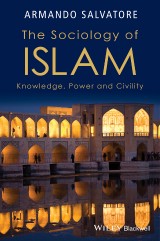Details

The Sociology of Islam
Knowledge, Power and Civility1. Aufl.
|
24,99 € |
|
| Verlag: | Wiley |
| Format: | |
| Veröffentl.: | 23.02.2016 |
| ISBN/EAN: | 9781118662625 |
| Sprache: | englisch |
| Anzahl Seiten: | 352 |
DRM-geschütztes eBook, Sie benötigen z.B. Adobe Digital Editions und eine Adobe ID zum Lesen.
Beschreibungen
<p><i>The Sociology of Islam</i> provides an accessible introduction to this emerging field of inquiry, teaching and debate. The study is located at the crucial intersection between a variety of disciplines in the social sciences and the humanities. It discusses the long-term dynamics of Islam as both a religion and as a social, political and cultural force.<br /><br />The volume focuses on ideas of knowledge, power and civility to provide students and readers with analytic and critical thinking frameworks for understanding the complex social facets of Islamic traditions and institutions. The study of the sociology of Islam improves the understanding of Islam as a diverse force that drives a variety of social and political arrangements.</p> <p>Delving into both conceptual questions and historical interpretations, <i>The Sociology of Islam</i> is a transdisciplinary, comparative resource for students, scholars, and policy makers seeking to understand Islam’s complex changes throughout history and its impact on the modern world.</p>
Preface and Acknowledgments ix <p>Introduction 1</p> <p>Knowledge and Power in the Sociology of Islam 1</p> <p>Knowledge/Charisma vs. Power/Wealth: The Challenge of Religious Movements 18</p> <p>Civility as the Engine of the Knowledge–Power Equation: Islam and ‘Islamdom’ 23</p> <p><b>PART I Patterns of Civility</b></p> <p><b>1 The Limits of Civil Society and the Path to Civility 43</b></p> <p>The Origins of Modern Civil Society 43</p> <p>Civil Society as a Site of Production of Modern Power 50</p> <p>Folding Civil Society into a Transversal Notion of Civility 57</p> <p><b>2 Brotherhood as a Matrix of Civility: The Islamic Ecumene and Beyond 73</b></p> <p>Between Networking, ‘Charisma,’ and Social Autonomy: The Contours of ‘Spiritual’ Brotherhoods 73</p> <p>Beyond Sufism: The Unfolding of the Brotherhood 85</p> <p>Rewriting Charisma into Brotherhood 92</p> <p><b>PART II Islamic Civility in Historical and Comparative Perspective</b></p> <p><b>3 Flexible Institutionalization and the Expansive Civility of the Islamic Ecumene 105</b></p> <p>The Steady Expansion of Islamic Patterns of Translocal Civility 105</p> <p>Authority, Autonomy, and Power Networks: A Grid of Flexible Institutions 114</p> <p>The Permutable Combinations of Normativity and Civility 118</p> <p><b>4 Social Autonomy and Civic Connectedness: The Islamic Ecumene in Comparative Perspective 131</b></p> <p>New Patterns of Civic Connectedness Centered on the ‘Commoners’ 131</p> <p>Liminality, Charisma, and Social Organization 140</p> <p>Municipal Autonomy vs. Translocal Connectedness 147</p> <p><b>PART III Modern Islamic Articulations of Civility</b></p> <p><b>5 Knowledge and Power: The Civilizing Process before Colonialism 165</b></p> <p>From the Mongol Impact to the Early Modern Knowledge–Power Configurations 165</p> <p>Taming theWarriors into Games of Civility? Violence, Warfare, and Peace 176</p> <p>The LongWave of PowerDecentralization 189</p> <p><b>6 Colonial Blueprints of Order and Civility 201</b></p> <p>The Metamorphosis of Civility under Colonialism 201</p> <p>Court Dynamics and Emerging Elites: The Complexification of the Civilizing Process 218</p> <p>Class, Gender, and Generation: The Ultimate Testing Grounds of the Educational-Civilizing Project 226</p> <p><b>7 Global Civility and Its Islamic Articulations 239</b></p> <p>The Dystopian Globalization of Civility 239</p> <p>Diversifying Civility as the Outcome of Civilizing Processes 251</p> <p>From Islamic Exceptionalism to a Plural Islamic Perspective 260</p> <p>Conclusion 271</p> <p>Overcoming Eurocentric Views: Religion and Civility within Islam/Islamdom 271</p> <p>The Institutional Mold of Islamic Civility: Contractualism vs. Corporatism? 278</p> <p>From the Postcolonial Condition toward New Fragile Patterns of Translocal Civility 287</p> <p>Index 295</p>
<p><b>Armando Salvatore </b>is Professor of Global Religious Studies at McGill University, Montreal, and Professor at the Centre for Arab & Islamic Studies of the Australian National University, Canberra. His work as a social scientist emphasizes transregional comparison and explores the Islamic ecumene’s socio-political trajectories as well as transcultural interconnections. As a complement to <i>The Sociology of Islam </i>he is editing <i>The Wiley Blackwell History of Islam</i>. Among his previous works are <i>Islam and the Political Discourse of Modernity </i>(1997), <i>Public Islam and the Common Good </i>(edited with Dale F. Eickelman, 2004), <i>The Public Sphere: Liberal Modernity, Catholicism and Islam </i>(2007), and <i>Islam and Modernity: Key Issues and Debates </i>(edited with Muhammad Khalid Masud and Martin van Bruinessen, 2009).</p>
<p>Sociologists of religion have long been awaiting a successor volume to Brian Turner 's pathbreaking but now dated <i>Weber and Islam</i> (1974). Armando Salvatore's new book provides just this update and much more. Ranging across a host of critical case studies and theoretical issues, Salvatore provides a masterful account of religious ethics, rationalization, and civility across the breadth of the Muslim world, from early times to today. The result is a book of deep intellectual insight, important, not just for the sociology of Islam, but for scholars and students interested in religion, ethics, and modernity in all civilizational traditions.<br /><b>Robert Hefner, Boston University<br /><br /></b>The sociology of Islam has been a late and controversial addition to the sociology of religion. This field of research has been the principal target of the critique of Orientalism and after 9/11 the study of Islam became heavily politicized. Terrorist attacks in Paris and Beirut have only compounded the long-standing difficulties of objective interpretation and understanding. In the first volume of what promises to be a major three volume masterpiece, Armando Salvatore steers a careful and judicious course through the various pitfalls that attend the field. The result is an academic triumph combining a sweeping historical vision of Islam with an analytical framework that is structured by the theme of knowledge-power. One waits with huge excitement for the delivery of the remaining volumes.<br /><b>Bryan Turner, City University of New York<br /><br /></b>A brilliant, pioneering effort to explain the cosmopolitan ethos within Islamicate civilization, <i>The Sociology of Islam</i> encompasses all the terminological boldness of Marshal Hodgson, making the Persianate and Islamicate elements of civic cosmopolitanism, across the vast Afro-Eurasian ecumene, accessible to the widest possible readership in both the humanities and the social sciences.<br /><b>Bruce B. Lawrence, author of <i>Who is Allah?</i> (2015)</b></p>

















